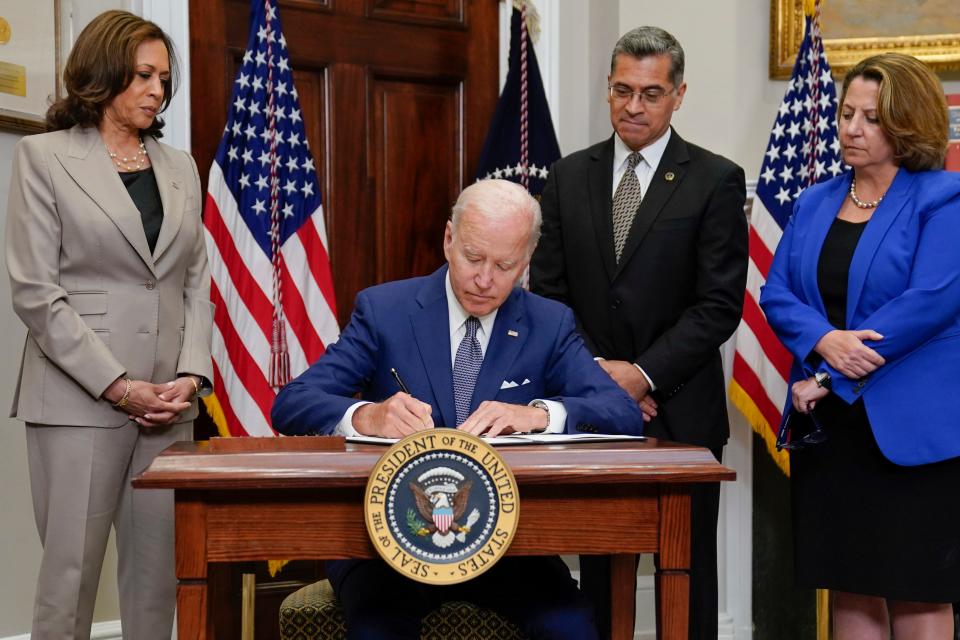With abortion bills stalled, congressional Democrats look to voters to save Roe
- Oops!Something went wrong.Please try again later.
- Oops!Something went wrong.Please try again later.
WASHINGTON – As the House passed the Women's Health Care Act on Friday to make Roe v. Wade the law of the land, its lead sponsor, Rep. Judy Chu, knew the celebration would be short-lived.
That bill and another, which would protect patients who travel across state lines for abortions, passed the House with just a handful of Republican support, but were headed for a roadblock in the Senate – if they would even make it to the floor for votes.
Instead, the real path to codify abortion rights goes through November, according to Chu, D-Calif., and other Democratic women leading the fight to protect women's reproductive rights.
Backers of abortion access believe gaining two more Senate seats in the midterm elections would be enough to end the filibuster keeping much of the progressive agenda – including reproductive rights – from passing. Even though Democrats hold a majority (50 senators plus Vice President Kamala Harris' tie-breaking vote), Democrats Joe Manchin of West Virginia and Kyrsten Sinema of Arizona oppose scrapping the rule, which requires 60 Senate votes to put bills on the floor for an up-or-down vote.
"We need two more senators," Chu told USA TODAY.
But she's no longer looking in the current Congress to persuade two members of the upper chamber. Chu is looking at progressive candidates running in the midterms.
"John Fetterman and Mandela Barnes," she said, referring to two lieutenant governors in Pennsylvania and Wisconsin who are running to flip Senate seats now held by Republicans. "That's why the November election is so important."

Biden + Congress = midterms
President Joe Biden and congressional Democrats have faced mounting pressure to respond to the Supreme Court decision overturning Roe v. Wade.
Most of that pressure has come from within the party, as abortion has become illegal in multiple states and some Republican-led state legislatures have also moved to prevent their residents from crossing state lines for abortion care.
The Department of Justice has said it would fight against efforts to restrict people from crossing state lines for abortion, claiming they violate the right to interstate commerce. A number of congressional Republicans also have said they oppose such a restriction, though only three of 208 GOP lawmakers voted Friday for the bill protecting women who cross state lines for the procedure.
Biden has taken other executive actions, such as forcing hospitals to provide abortions in emergency situations and making sure pharmaceutical abortions would still be available. Progressives on Capitol Hill have also called on him to declare a public health emergency to protect abortion access – a request he has yet to answer. But executive actions can be challenged in court, and they last only as long as the occupant who issued them occupies the White House.
The president has said there’s no executive action he can take to restore Roe. Only Congress can do that by passing a law, he said.

With that legislative path in peril, Biden and Democrats in Congress are looking to voters to take action.
“The path is the November election,” said Rep. Jan Schakowsky, D-Ill. “I’ve seen the polling. I’ve seen a change in the intensity of voters who say they are going to vote because of the Supreme Court decision.”
Some 78% of Democrats are more likely to vote in the 2022 midterms because of the high court’s decision that overturned 50 years of legal abortions, according to an NPR/PBS NewsHour/Marist poll in June.
However, a USA TODAY/Suffolk University Poll also taken last month suggested economic conditions would have a bigger impact than abortion on whether voters choose to cast a ballot.
Without Roe, what happens to IVF?: People struggling to conceive worry embryos are at risk
'Voters will know where the senators stand'
Rep. Alma Adams, D-N.C., knows the Senate probably won't pass the House bill to codify Roe – and might not put it up for a vote – but she sees value in the accountability.
"If the Senate refuses to pass it, voters will know where the senators stand," she said in an interview with USA TODAY.
Senate Majority Leader Chuck Schumer, D-N.Y., said something similar when the chamber previously voted 49-51 on the House act in May.
Though the Democratic-led effort failed, Schumer and other Democrats have parlayed the Supreme Court opinion and Senate vote into a major midterm campaign platform.
But it's unclear whether Schumer will bring the bill to the floor when he knows will fail again.
The Senate is facing competing priorities and racing against the clock to pass legislation on other issues before the end of the August recess begins.
Schumer has indicated his priorities are passing a deal with Sen. Joe Manchin, D-W.Va., to lower the cost of prescription drugs and get a separate bill on the floor that would help U.S. semiconductor chip makers. Senators have also said they are close to an agreement on legislation that would overhaul the Electoral Count Act, the nearly 140-year-old law that specifies how to count the electoral votes from states for the presidency and what to do if there are objections to the results.
Pursuing a federal abortion ban
Democrats have raised concerns that if Republicans gain the majority in the fall, they will pursue a nationwide abortion ban. Though some Republicans have said they won't do that, Schakowsky and other Democrats say they don't believe them.
Even if Republicans pursue a nationwide abortion ban, they will run into Biden's veto, underscoring that the Supreme Court and American voters have had the most power in determining the fate of abortion rights.
For Adams, the effort to codify Roe continues at the ballot box.
"Democrats ... know the Dobbs decision is a disaster for American women," Adams said. "It's an historic attack on women."
The House and Senate have responsibilities and are accountable to the people in members' districts and across the country, she said.
"We are doing what we need to do on the House side, and that's the right thing," Adams said. "We will continue to fight like hell."
What's next: Where the abortion fight goes from here: Roe overruled, but the battle will continue
How the GOP won: Overturning Roe v. Wade a triumph of decades long push by conservative legal movement
Candy Woodall is a Congress reporter for USA TODAY. She can be reached at cwoodall@usatoday.com or on Twitter at @candynotcandace.
This article originally appeared on USA TODAY: Biden, Dems in Congress look to voters to save abortion rights

